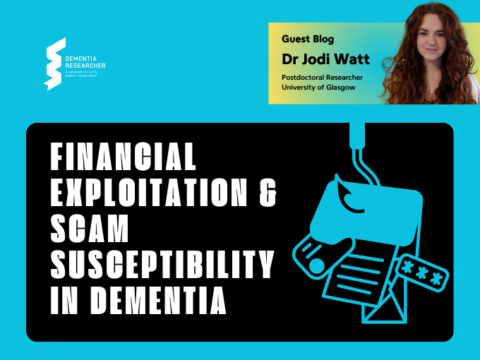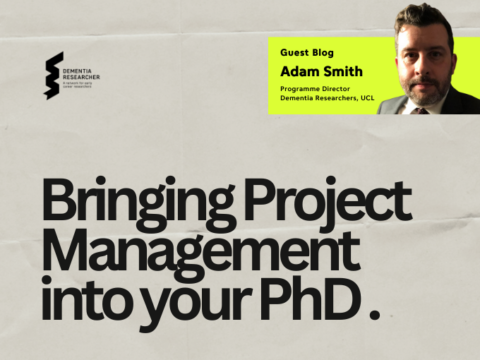Hello, and welcome back to my corner of the Dementia Researcher blogs! Today I want to talk about what could prove to be an exciting development in dementia research (but not everyone agrees!) So what am I talking about? Can you guess?
News outlets have erupted in recent weeks in response to the announcement that the Food and Drug Administration (FDA) have approved the clinical use of a new Alzheimer’s treatment for the first time in nearly 20 years. The new drug is produced by American multinational biotechnology company Biogen under the trade name “Aduhelm”. It is an antibody that targets the aggregates of amyloid-beta protein that clump together in the brains of Alzheimer’s patients, causing the death and loss of brain cells and the precious memories stored within their networks. The drug binds to amyloid beta with the aim of reducing the number of aggregates/plaques in the brain, potentially slowing disease progression.
It all sounds very promising, but for some reason the news wasn’t greeted with the resounding optimism and celebration that you would expect from a potentially game changing treatment. So why the mixed response?

The news headlines presented a positive story, and didn’t much talk about the controversy
One factor is the contradiction the FDA have made regarding the approval of Aduhelm, having concluded in a trial last year that there was not enough evidence to support its efficacy as a treatment. A Phase 3 review in November 2020 resulted in a resounding rejection of the drug with 10 of the 11 external reviewers of the data concluding it was insufficient to warrant approval for clinical use. Dr. Michael Carome, director of health research for the non-profit watchdog group Public Citizen went as far as saying “The FDA’s decision shows a stunning disregard for science and eviscerates the agency’s standards for approving new drugs,” A damning review indeed!
Another big issue is the potential cost of the drug. As with many antibody treatments, Aduhelm will be administered by infusion with a new dose required once every 4 weeks. US estimates price the drug at $4,312 per treatment, racking up a rather considerable $56,000 per year. This is a bit of an issue when you consider that, in May of this year, the Institute for Clinical and Economic Review released a report stating a drug should ideally cost between $2,560 and $8,290 a year to be viable and noted in regard to Aduhelm that “the evidence is insufficient to conclude that the clinical benefits of aducanumab outweigh its harms or, indeed, that it reduces progression”.
So why the approval? The evidence is firmly stacked up against it right? Well don’t lose hope just yet. I have some better news for you!
Let’s start with a patient story from the clinical trials. The drug is aimed at patients who are showing the very early signs of Alzheimer’s. In particular it looks at people suffering with mild cognitive impairment due to the disease or those with early Alzheimer’s dementia. Patients like this are still self-aware and mostly able but they suffer frequent mental lapses. This period is widely regarded as “rescuable” if we can find a way because the brain isn’t thought to be damaged beyond repair at this point.
Jenny Knap, 69, is one such patient and she has been receiving infusions of Aduhelm for over a year. In a recent interview with CNN she told reporters “I can’t say if I noticed it on a daily basis, but I do think overall, I’m doing much better in terms of looking for where my glasses are — things like that”. This is a classic example of a lapse you would expect in such a patient and her physician, Dr. Babak Tousi commented “Aducanumab’s (Aduhelm’s scientific name) promise is to slow down the progression of the disease and not to improve the cognition. In her case, we did not appreciate any major decline.” Good news in Jenny’s case then, and she is not alone! Commenting on the study data, the FDA director for Drug Evaluation and Research stated “We determined this drug favourably modifies a key pathological process, reducing the amount of amyloid plaque in the brain of patients with Alzheimer’s, and that this improvement is reasonably likely to predict clinical benefit of the drug.”
She is not alone in her optimism with groups like the Alzheimer’s Association hailing the FDA’s decision to approve the drug as a step towards opening the door for more extensive research into chronic brain diseases. In recent years we have seen retractions in funding as large pharmaceutical organisations become sceptical about the hopes of finding treatments for diseases like Alzheimer’s in the near future. This could provide such organisations with a bit more faith that this is a valid fight. Especially when you consider the words of ADDF Founding Executive Director and Chief Science Officer, Howard Fillit, M.D:
“Aducanumab is just the first of several Alzheimer’s drugs that will become available in the next five to 10 years,”
“The robust Alzheimer’s research pipeline, complemented by a growing number of biomarkers and other important research tools, means that the clinical trials underway today are more rigorous and more promising than ever.”
 The drug is also only approved on the condition of a follow up trial to prove that it does slow the progression of Alzheimer’s. There is hope it can prove the doubters wrong and represent a real game changer, paving the way for a new wave of treatments for our loved ones. At the moment, Aduhelm feels like it’s walking a tightrope but let me finish with a reference from the TV show Fargo that I believe is fitting.
The drug is also only approved on the condition of a follow up trial to prove that it does slow the progression of Alzheimer’s. There is hope it can prove the doubters wrong and represent a real game changer, paving the way for a new wave of treatments for our loved ones. At the moment, Aduhelm feels like it’s walking a tightrope but let me finish with a reference from the TV show Fargo that I believe is fitting.
Series one protagonist sits with his neighbour in the middle of the night and poses an ethical question about what to do when he knows someone is guilty but can’t find the proof (run with me here, I reckon it’s relevant and I love Fargo!). The man replies with a parable about a rich man who wants to fix the suffering in the world. He starts by donating all his money. It’s not enough. He donates a kidney but it is still not enough so he takes his own life, writing “organ donor” on the walls before he completes the act. When asked the point of the story the man replies “Only a fool thinks he can solve the world’s problems.” Gus replies with one of the most optimistic lines of the show: “Yeah, but you gotta try, don’t you?”
This is where Aduhelm sits for me. It would be foolish to think this will solve all cases of Alzheimer’s, but if it can improve the lives of some, we have to try right?
Dementia Researcher Comment: The NHS Clinical Delivery Network recently held a webinar discussing the potential impact of disease modifiable treatments, and challenges to implementation, and how infusion based treatments might be delivered. You can see their webinar from the 19th May 2021 here on YouTube.
Author

Dr Sam Moxon
Dr Sam Moxon is a biomaterials scientist at the University of Manchester. His expertise falls on the interface between biology and engineering. His PhD focussed on regenerative medicine and he now works on trying to develop 3D bioprinting techniques with human stem cells, so that we better understand and treat degenerative diseases. Outside of the lab he hikes through the Lake District and is an expert on all things Disney.
What do you make of this news? Reply in the box below

 Print This Post
Print This Post




